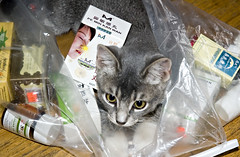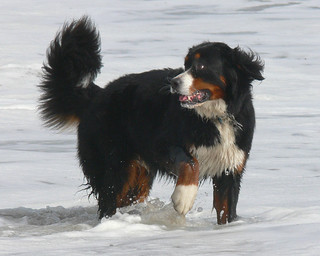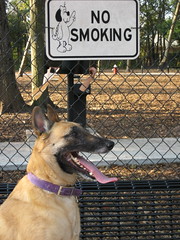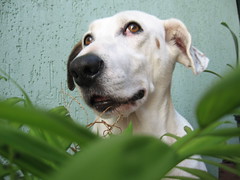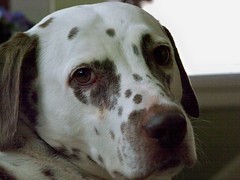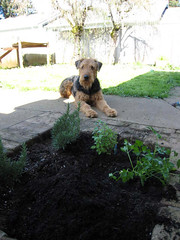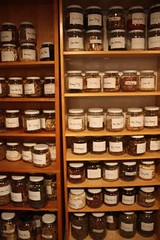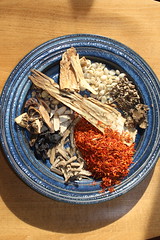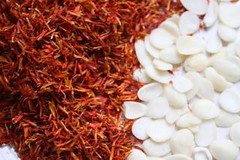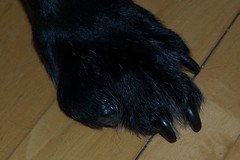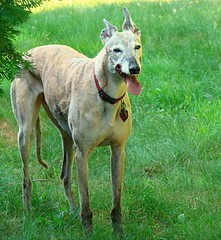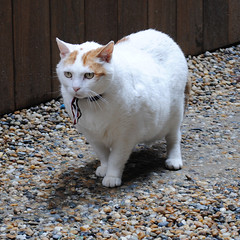Chinese medicine and cancer – phlegm nodules and blood stagnation
Monday, May 7th, 2012 The main focus of Chinese medicine is on treating the animal, the cancer is secondary.
The main focus of Chinese medicine is on treating the animal, the cancer is secondary.
Why did the cancer get there is in first place? Because of a longstanding imbalance in the body. In western medicine we would say that the immune system malfunctioned.
Why? Usually because of diet, genetics or environmental factors.
The job of the practitioner is to look at an animal as a whole being. I usually take about 30-60 minutes just to get a full history on my animals I treat for cancer. With the whole history I am treating the whole animal and not just the cancer. This is why the animals I treat often times feel better than before their cancer diagnosis after we start treatment
So why do I write articles that look like cook book recipes?
Many times the same cancers come from the same deficiencies. For example squamous cell carcinoma is almost always going to come from an animal who is having dampness/inflammation issues. Mast cell tumors almost always are in animals who have blood deficiencies. So you can cook book some of these cancers and get it right most of the time.
However the best is to find a veterinarian with training in Chinese medicine who can look at your animal and guild you to what is the best protocol for them. Them and not their cancer. I realized that some of you live in places that it is not a possibility in which case I am hoping you can use my guilds with your animal’s primary vet to come up with a treatment protocol.
So on to the Chinese Medicine!
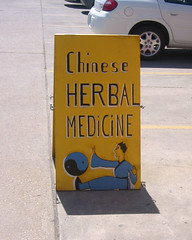 Traditional Chinese medicine also known as TCM uses a system of metaphors to describe disease and come up with treatment methods. As odd as it can seem to a newcomer to this art, the system works.
Traditional Chinese medicine also known as TCM uses a system of metaphors to describe disease and come up with treatment methods. As odd as it can seem to a newcomer to this art, the system works.
This system was developed long before anatomy was known as well as it is today. In fact when TCM was first developed there was a ban on dissection and most of what was known about anatomy was learned on the battlefield by those who treated the wounded. Because of this many of the Chinese organ systems are different then the western ones. For example in TCM the spleen is considered the main organ of digestion even though we know today that the spleen really has very little to do with digestion. Even so the points in acupuncture, which correspond to the spleen, often treat digestive disorders and the herbs for digestion are often considered spleen tonics.
It would be really easy for me to give you 1000 pages or more on Traditional Chinese Medicine but really I want to talk about cancer and how it related to Chinese medicine and how you use Chinese diagnosis to figure out what herbs and supplements to give an animal.
The two most common Chinese diagnosises for cancer are.
Phlegm nodules/dampness and blood stagnation.
 In addition you can have cancers that get into the realm of triple burner obstruction and blood heat but those both end up connected to one of the first categories. Blood heat is when the blood congeals and produces toxic heat and triple burner obstruction often is related to both phlegm obstruction and/or blood stagnation. More about those later.
In addition you can have cancers that get into the realm of triple burner obstruction and blood heat but those both end up connected to one of the first categories. Blood heat is when the blood congeals and produces toxic heat and triple burner obstruction often is related to both phlegm obstruction and/or blood stagnation. More about those later.
In addition there are many minor imbalances which make the body predisposed to cancer.
Spleen deficiency leads to phlegm build up that leads to phlegm nodules.
Blood deficiency leads to problems with blood movement which leads to blood stagnation.
Many of these lesser patterns are also from poor diet, genetics or environmental factors.
So what do you need to know?
- Phlegm nodule cancers tend to be inflammatory. They are hot and painful and grow fast. They are usually very locally invasive but can also spread.
 These cancers are lymphoma, osteosarcoma, anal gland tumors and squamous cell carcinoma. There are many other phlegm cancers.
These cancers are lymphoma, osteosarcoma, anal gland tumors and squamous cell carcinoma. There are many other phlegm cancers.Most of these animals have had some kind of inflammatory disease in their history. They are more prone to being gassy. They may have been or are overweight. They have more of an excess personality – they are outgoing and have a lot of energy but not always stamina. They may be prone to digestive upset usually with phlemy diarrhea or vomit. If they have infections they are usually hot and severe. They may have multiple lipomas. Often times as these animals get older they become more deficient in both personality and physically but when you look back at their history it tells a different story.
These cancers do best with herbals like Hoxsey like formula and Si Miao San. They may also do well with Xiao Chai Hu Tang and its sister formulas because long time dampness can lead to triple burner obstruction. See below for more info on TBO.
- Blood stagnation cancers are the cancers that are caused by abnormal blood flow. They may also have an inflammatory component to them although usually it is milder than with the straight phlegm/dampness cancers.
Cancers like mast cell tumors, hemangiosarcoma, many of the liver tumors, thyroid tumors, and salivary gland tumors tend to be blood stagnation cancers.
These animals have a history of blood flow issues and blood deficiency. They may be a little timid. They are prone to dry skin and maybe dry eyes. They may have had infections in the past but they are usually mild. They may have back pain or weaknesses or shifting lameness. If they have skin tumors they are usually small and benign and hang off the skin. They may also have digestive upset but usually it is more liquid diarrhea or stomach pain. They may be sensitive to stress.
These cancers are best treated with Xue Fu Zhu Yu Tang and its sister formulas, Bu Zhong Yi Qi Tang, and single blood moving herbs like curcumin.
In addition chemotherapy and radiation can cause blood deficiency and stagnation so I often use these formulas in animals receiving these treatments even if the cancer being treating is a phlegm nodule cancer.
- To make things harder many cancers are mixed with some components of blood stagnation and some of phlegm/dampness. Leukemia is a good example, usually I use blood movers like Xue Fu Zhu Yu Tang with dampness herbs like Hoxsey. After all this cancer is in the blood stagnating it but also has a damp component to it. Sanshedan ChuanBeiye and Artemisinin can also help with these mixed cancers.
- Some cancers lead to or are caused by triple burner obstruction. Hemangiosarcoma is the best example of this or many other abdominal tumors fall into this category including many of the lymphomas I see. For these cancers I always use Xiao chai Hu Tang or one of its related formulas and then also treat the original pattern that lead to the TBO either with acupuncture or additional herbals.
A little more on Triple burner obstruction
The triple burner in Traditional Chinese Medicine runs down the center line of the body.
There is the upper burner which includes the lungs and heart, middle burner with the spleen and liver, and lower burner with the kidneys and urinary bladder. If the triple Burner is obstructed, yin and yang cannot meet and there is a separation of yin and yang in the body. The yin or water of the kidneys needs to come up and cool and mist the lungs and heart, and the yang or fire of the heart needs to descend down and spark the fire of life of the kidneys.
When yin and yang come together you get life. Both these functions happen by passage through the triple burner along the centerline of your body. If these functions cannot happen, the upper body gets hotter and the lower body gets weaker. If yin and yang cannot meet then the body stops working.
 Here is another way to look at it. If you look at yang as the chemical reactions in the body which fuel life, and yin as the antioxidant response that makes sure no harmful products are left behind, you can understand how these two relate. You need both for life and you need them to work together. Without the yin antioxidant response we become toxic, without the yang fueling the body we become weak and deficient. If either of these functions stop we are in trouble.
Here is another way to look at it. If you look at yang as the chemical reactions in the body which fuel life, and yin as the antioxidant response that makes sure no harmful products are left behind, you can understand how these two relate. You need both for life and you need them to work together. Without the yin antioxidant response we become toxic, without the yang fueling the body we become weak and deficient. If either of these functions stop we are in trouble. Triple burner obstruction will lead to death – sometimes very quickly, if the obstruction is complete and sudden and sometimes over a longer time, if it happens slowly.
Triple burner obstruction commonly manifests with excess conditions in the front of the body such as coughing, vomiting, anxiety, headache, and/or panting and deficiency or weak conditions in the back of the body such as hind leg weakness and incontinence. There is usually some kind of obstruction in the middle of the body such as a tumor in the liver or spleen, bloated abdomen or back pain. - Bleeding cancers can be very deadly. Most bleeding cancers are from blood stagnation. In hemangiosarcoma one of the largest issues is that the blood stagnation leads to bleeding so I always work with herbs that address this, the main one being San Qi (pseudoginseng) usually in both the form of Yunnan Baiyao and in added San Qi to the formulas I work with. For bleeding cancers Yunnan Baiyao is very important.
Usually I work with 4-6 supplements/herbals in dogs with cancer and 1-3 in cats with cancer.
Complicated? You bet! Impossible? No
This is why I strongly recommend trying to find a veterinary herbalist in your community to work with. Each animal is different; each animal needs a slightly different formula combination. I often have animals I am treating with the same cancers who are on different protocols. The best results come from using the right formulas in combination with acupuncture.
In some animals we will change formulas as the symptoms and cancer changes as well. Sometimes what worked at first will stop working or we will need to add something else. If you have a practitioner you are working with they can hopefully catch these shifts early and make changes before it is too late.
See How to find a good holistic vet
Return to Integrative and Holistic Methods for Treating Cancer in Cats and Dogs
